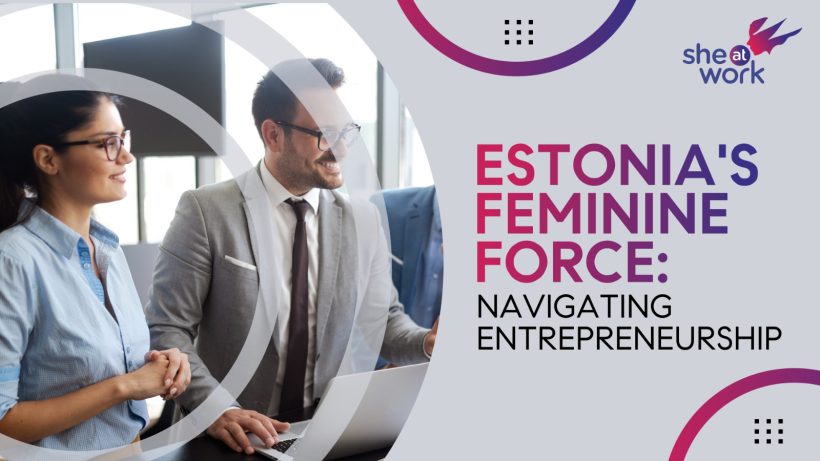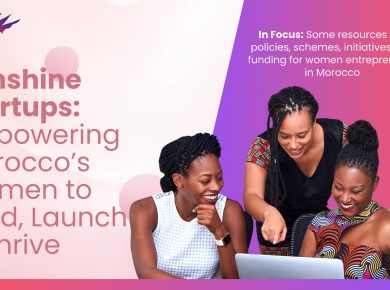#EstoniaEntrepreneurship #WomenEmpowerment #GovernmentInitiatives
Estonia, a nation known for its dynamic entrepreneurial spirit, is taking significant strides towards fostering women’s entrepreneurship. While women currently represent 28% of entrepreneurs in the country (of which 72% are solo entrepreneurs) there’s a strong push to enhance this number and empower women to thrive as business leaders.
Estonian women entrepreneurs are making their mark across diverse sectors, from trade and services to arts, education and technology. However, they remain underrepresented in industries like construction and agriculture. To bridge this gap, the Estonian government has rolled out an array of schemes, policies and initiatives – aimed at elevating women in business.
Here, we explore Estonia’s pioneering efforts to support and propel women entrepreneurs, shedding light on the transformative policies that are shaping the landscape of women-led businesses in this Baltic nation.
Let’s look at government policies, initiatives and schemes within reach of women entrepreneurs in Estonia.
> Policy responsibility
It’s the responsibility of the Ministry of Economic Affairs and Communications as far as Entrepreneurship and SME policy goes in general. And, most of the disadvantaged target groups of inclusive entrepreneurship fall under the policy responsibility of the Ministry of Social Affairs. The Enterprise Growth Strategy 2014-20 emphasizes support for innovative start-ups and is currently fostering high-growth businesses.
There are several important actors that support the implementation of the Growth Strategy including Enterprise Estonia (EAS), which is responsible for implementing much of the strategy, as its mandate is to support innovation and entrepreneurship. Therefore, it delivers several entrepreneurship support schemes, including business counselling and entrepreneurship training, as well as some grants and activities supporting innovation and exports by Estonian companies.
In addition, KredEx (a public financing institution) provides state-backed loans and guarantees, as well as performs public investments in the venture capital market. Some of the support schemes (eg start-up grants and regional support programmes) have been recently moved from Enterprise Estonia to State Support Service Center (RTK), which acts under the Ministry of Finance. Enterprise support programmes related to environment and resource efficiency are administered by the Center for Environmental Investments (KIK), belonging to the Ministry of Environment. Plus, the start-up programmes for the unemployed are administered by the Unemployment Insurance Fund, under the Ministry of Social Affairs.
> Inclusive entrepreneurship strategies and objectives
SME and entrepreneurship policy in Estonia, outlined in the Enterprise Growth Strategy 2014-201 focused on supporting innovative and high-growth start-ups and SMEs. The principal policy objective is – to increase the growth potential of the Estonian economy through SME innovation, digitalization of the economy and higher productivity.
One of the aims of the Estonian Enterprise Growth Strategy 2014-20 was – to instill the sense of entrepreneurial spirit among youth and other target groups; this is connected to the Youth Field Development Plan 2014-20 and its goal of supporting creative, enterprising and initiative-taking attitudes to life. In addition to these two strategies, the Welfare Development Plan 2016-233 outlines actions to support female entrepreneurship. It outlines plans to examine the factors behind the low level of entrepreneurial activities by women, and also foresees some small-scale promotional activities to encourage female entrepreneurship.
These activities were expected to include training for business advisors in County Development Centres to offer specific advice to starting female entrepreneurs, supporting mentoring and networking opportunities for women in business. There is no dedicated national strategy for inclusive entrepreneurship. While there are no tailored entrepreneurship measures for groups that are under-represented or disadvantaged in the labour market, the Growth Strategy includes some measures to strengthen entrepreneurship education and to promote innovative financing instruments.
> Policy measures in response to COVID-19 – to support entrepreneurs & the self-employed
The COVID-19 crisis measures in Estonia were mostly designed with universal approach and no special provisions for the disadvantaged groups. The only exception being self-employed, who were given a short-term social tax-relief, as their social tax advanced contribution for the second quarter of 2020 was waved by the government.
This was, however, the only specific measure to help self-employed and they were excluded from most of the crisis aid programmes – both grants and loans. When the exclusion of the self-employed from public COVID-support measures (especially – loss of salary compensation) was been raised by the national SME association EVEA, it lead to the government starting the process of reforming the unemployment insurance system, in order to make possible the participation in the system by self-employed and business owners without employment contracts.
Schemes
Two of the most successful schemes are:
– “Everything is possible!” (“Kõik on Võimalik!”) is a business development programme for women entrepreneurs; and it was launched in 2018 by NGO BWP Estonia in co-operation with the Coca-Cola Foundation and The Estonian Business School and continued in 2019-20.
In addition to its initial goal to provide knowledge, inspiration and encouragement to women to start a business, in 2019 the programme increased its focus on women entrepreneurs who wanted to grow their businesses. The initiative includes “inspiration trainings” in several regions, building teams and networks of female entrepreneurs, and a series of training webinars. In order to increase the impact and the outreach, a public agency StartUp Estonia and the leading Estonian media group Ekspress Media were invited for partnership to increase the scheme’s reach and impact. More than 2 000 women participated in the programme since its inception. It continues in 2020 and will be concluded with Women Entrepreneurs Memorandum inviting stakeholder organisations and female entrepreneurs to promote and support women’s entrepreneurship.
> Future Heroes (formerly The Superheroes Estonia) programme is a growth mindset driven leadership & business accelerator for 13-17 year old girls to unlock their potential and create positive impact in the world. Started in 2017 as a private initiative, it is a four-month self-realization and entrepreneurship programme with the aim of encouraging young people to be confident, cooperative and committed to the goal through inspiring role models, strong mentors and practical workshops. During the course of the programme, girls were given the knowledge needed to create their own projects, including entrepreneurship, project management, teamwork, product development, media relations, critical thinking and public speaking.
> Initiatives for women
No dedicated pubic initiatives are currently in place to promote entrepreneurship to women. Moreover, in July 2020 the Ministry of Finance announced of the intention to terminate public funding agreement with some of the NGOs dealing with gender equality, including ENUT. This is an important gap because research by BPW Estonia identifies a need for mentors and mentoring programmes, to help female entrepreneurs to grow their businesses.
However, there are several NGOs that actively promote female entrepreneurship and providing networking platforms for business and professional women. Eg The Estonian Association of Business and Professional Women (BPW Estonia) (EENA), The Estonian Women’s Studies and Resource Centre (ENUT), QUIN-Estonia, a local chapter of the Global Women’s Inventors and Innovators Network, Female Investors’ Club (Naisinvestorite Klubi MTÜ) – a networking and training platform for promoting financial literacy and investment activities among women. The Estonian Women’s Studies and Resource Centre (ENUT) is a non-profit organization that promotes gender equality, including in self-employment. Since 2017 it organizes the annual
conference “Full speed to female entrepreneurship!” (Hoogu naisettevõtlusele!). In 2019 it was also combined with celebrating of the UN Women’s Entrepreneurship Day on 19 November.
https://www.oecd.org/cfe/smes/Estonia-IE-2020.pdf
> Policies
Entrepreneurship and SME policy is generally guided by the Enterprise Growth Strategy 2014-20, which emphasizes support for innovative start-ups and fostering high-growth businesses.
There are several important factors that support the implementation of the Growth Strategy including Thematic Committee on priority areas, which functions as an advisory and assessment body for implementing and updating the Growth Strategy.
Enterprise Estonia is responsible for implementing much of the strategy, as its mandate is to support innovation and entrepreneurship. Therefore, it delivers several entrepreneurship support schemes, including business counselling and entrepreneurship training.
Monitoring and evaluation of public policies is relatively strong in Estonia compared to other EU Member States, which is reflected in a sound monitoring system of the Estonian Enterprise Growth strategy, including ex-ante analysis of the strategy, continuous monitoring of output indicators and strategic evaluations every two years.
> Financing entrepreneurship
Although the availability of start-up financing has increased in recent years, the majority of entrepreneurs and SMEs in Estonia still perceive access to finance as a significant obstacle for doing business. And, this is especially true for new start-ups and very small businesses.
Since 2014, policy makers have clearly put an emphasis on shifting from grants to state- backed loans and guarantees. Approximately one-third of all enterprise-related funding from the European Regional Development Fund for 2014-20 was assigned to KredEx.
The main instruments for new and small businesses are publicly guaranteed start-up loan and small loan schemes which are delivered through private sector banks. There are also a number of microfinance schemes available. Notable schemes include ETNA, which targets women entrepreneurs in rural areas who are self-employed or owners of a microenterprise. The scheme was established with support from the Open Estonia Foundation and has also established loan groups for women in 10 rural regions. Participants in the microfinance and loan group schemes are also supported with entrepreneurship training and individual mentoring.
The Estonian Ministry of Finance launched a programme promoting financial literacy among Estonian people for the period 2013-20. The Financial Supervision Authority (FSA) is operating a financial literacy website5 providing objective and reliable information and guidance on budget planning, saving, borrowing, investing, pensions and insurance products.
Estonia does not have special policy measures for promoting female entrepreneurship, and it does not appear to be a current priority for policy makers. There are, however, a number women-specific entrepreneurship training and networking programmes, most of which are operated by non-governmental women’s organizations.
Examples include:
· The Estonian Association of Business and Professional Women (BPW Estonia), which is a women’s entrepreneurship network that was founded in 1992 to facilitate information and idea exchanges and inspire women being entrepreneurial; 21
· “Everything is possible!” (“Kõik on Võimalik!”) – as mentioned earlier. The initiative aims to increase the share of female entrepreneurs in Estonia and to provide knowledge, inspiration and encouragement to women to start a new or to expand an existing business.
· ETNA Eestimaal, is the Association of Rural Women Entrepreneurs and it offers entrepreneurship training, networking opportunities. The association also operates a small micro-credit scheme;
· The Estonian Women’s Studies and Resource Centre (ENUT) is a non-profit organisation that promotes gender equality, including in self-employment. 24 It organised the conference “Full speed to female entrepreneurship!” (Hoogu naisettevõtlusele!) in November 2017 with several NGOs and the Minister of Entrepreneurship. It brought together most of the actors involved in promotion of female entrepreneurship and in the development and implementation of SME policies in general.
· QUIN-Estonia, a local chapter of the Global Women’s Inventors and Innovators Network;
· Female Investors’ Club (Naisinvestorite Klubi MTÜ) – a networking and training platform for promoting financial literacy and investment activities among women.
https://www.oecd.org/cfe/smes/ESTONIA-IE-Country-Note-2018.pdf










